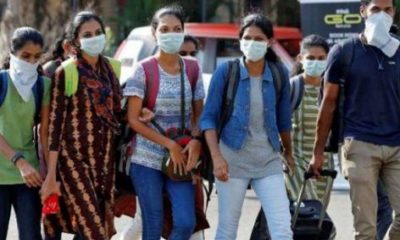World
Obama to push Sharif to do more to counter terrorism

By Arun Kumar
Washington: As Pakistan Prime Minister Nawaz Sharif arrived in Washington, the White House made clear that its top priority would be how to take on extremist elements inside Pakistan who have “committed terrible acts of terrorism.”
The US “has an important security relationship with Pakistan, that our security forces have in a variety of ways been able to effectively coordinate our efforts in a way that enhances the national security of both the United States and Pakistan,” the White spokesman Josh Earnest told reporters Tuesday.
President Barack Obama, who is set to meet Sharif at the White House on Thursday, he said will come “with some ideas about what more the Pakistanis could do to strengthen the relationship between our two countries and to advance the security interests of our two countries.”
“Obviously there are extremist elements inside of Pakistan that have committed terrible acts of violence and terrible acts of terrorism inside of Pakistan,” Earnest said describing it as a “shared priority of our two countries.”
“This risk that we sense emanates from this broader region .is a threat that Pakistan has had to deal with firsthand, and it underscores the importance of our security relationship with the Pakistanis,” he said.
Obama, Earnest indicated, would also discuss with Sharif the need to push the Taliban back into peace negotiations in Afghanistan, where the US in a policy reversal has decided to delay its troop drawdown beyond 2016.
“One of the early rounds of reconciliation talks between the Afghan government and the Taliban was actually hosted by the Pakistani government inside of Pakistan,” Earnest noted.
“So it’s clear that the Pakistan government recognizes how important those reconciliation efforts are and we’re pleased that they’ve stepped up in trying to facilitate constructive conversations,” he said.
Asked if there was a feeling in the administration that Pakistan was not doing enough to tamp down the extremist interest there, Earnest acknowledged “that there have been some peaks and troughs in the relationship between the United States and Pakistan.”
“What the President hopes to do is to strengthen the relationship between our two countries based on our shared interest,” he said describing “countering extremist forces in that region of the world” as such.
“This is something that Pakistan has to deal with on their doorstep,” Earnest said. “And to the extent that the United States can be helpful in that regard, we would like to be, principally because we believe that it’s in our interest for Pakistan to succeed in their fight against those extremist elements.”
Ahead of his meeting with Obama, Sharif will also meet Secretary of State John Kerry Wednesday.
Meanwhile, a South Asia expert has suggested that Obama “must focus the meeting on gaining full Pakistani cooperation with the US-led mission in Afghanistan, rather than on striking a civil nuclear deal-the terms of which Pakistan would be unlikely to honour in any case.”
“Discussing civil nuclear cooperation with the Pakistani government before it has begun to crack down on terrorist groups that are undermining the US mission in Afghanistan and that fuel Indo-Pakistani tensions would compromise vital US national security interests in the region,” wrote Lisa Curtis, a senior research fellow at the Heritage Foundation.
“Rewarding a country that is responsible for the most significant nuclear proliferation disaster in history and which has continually rebuffed US appeals to crack down on terrorists would undermine US credibility and contribute to regional instability,” she wrote.
World
Lockdowns in China Force Urban Communities to Defy Censorship and Vent Frustration Online

Shanghai’s rich middle class is leading a wave of online dissent over the strict and prolonged lockdowns imposed in various parts of the country. Chinese internet censorship is struggling as patience is wearing thin in many urban centers, coming up with creative forms of online protests.
Social Media Posts Revealing Lockdown Tension in Shanghai
Drawn-out lockdowns are nothing new in China as authorities insist with the nation’s zero-Covid policy since the start of the pandemic. Currently over This time around, however, metropolitan areas like Shanghai are increasingly difficult to keep quiet, given that its more than 25 million residents have seen weeks of total isolation along with food shortages and many other service interruptions.
Dozens of towns and reportedly over 300 million Chinese citizens have been affected by lockdowns of different severity. As expected, urban netizens have been most outspoken over their difficulties by finding creative ways to get around state censorship and bans placed on topics, news comments and spontaneous campaigns.
Shanghai residents have been using mobile proxies and hijacking seemingly unrelated hashtags to talk about healthcare issues, delivery failures and the overall severity of their situation. The “positive energy” that the Chinese government wants to transmit during the recent prolonged series of lockdowns does not come naturally to those counting food supplies and online censors are working hard to filter words, trending topics and undesired social media sharing.
WeChat groups and message threads are under constant monitoring. Posts questioning the zero-Covid approach have been quickly deleted, including by leading Chinese health experts like Dr. Zhong Nanshan. Video footage is soon censored and protests and investigations are quickly made to disappear.
Where this has not worked, officials have exposed banners with warnings and outright threats like “watch your own mouth or face punishment”, while drones have been patrolling the city skies. Yet, if anything, this has led to further tensions and unspoken confrontation with Shanghai’s educated and affluent middle class.
Creative Online Solutions Harnessing Civic Energy
Announcements by Chinese social media that they would be publishing the IP addresses of users who “spread rumors” have not helped either. Tech industry research has shown that much of Asia’s tech-savvy population has a habit of using mobile proxies and other privacy tools, quickly finding workarounds to browse the internet freely and talk to the world about the hottest topics.
The sheer volume of forbidden posts is already a challenge for the very censorship system, experts explain. Unable to track all trending hashtags, state workers overlook topics that speak about the US, Ukraine or other popular news. Linking human rights elsewhere to their situation, Chinese online dissidents establish their informal channels and “hijack” the conversation to share personal or publicly relevant information about the Covid suppression in their town.
Sarcastic and satirical posts still dominate. Others hope to evade the censors by replacing words from famous poems or the national anthem. One thing is certain – social media, when harnessed with the right creativity, has proven its ability to mount pressure on the government in even some of the most strictly controlled tech environments like China.























